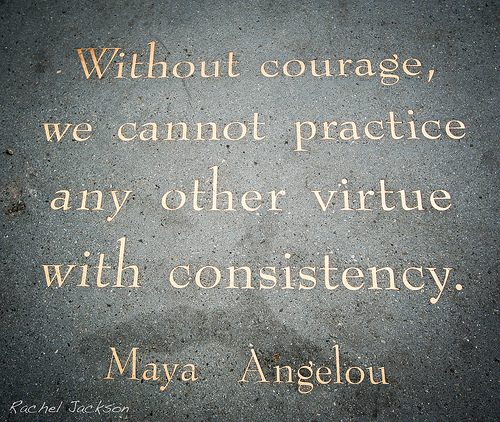Without courage, we cannot practice any other virtue with consistency. We can’t be kind, true, merciful, generous, or honest.” – Maya Angelou
What does that mean?
Courage is a powerful word. Whether it is one man standing against a line of tanks, or simply resisting your own personal temptation.
Courage is a foundational virtue, without which we would be, as the quote says, inconsistent. It takes courage to say no to the donut not just once but over and over again.
Whatever vice you are trying to avoid, anyone can do it once. It takes courage to do it repeatedly, until saying ‘No’ becomes a habit, and then part of your character.
The same is true of the other virtues mentioned in the quote, as well as many others. Can you be truthful in a tough situation without courage? Once or twice, but regularly? What of kindness, generosity, or honesty?
Why is courage important?
This post isn’t about the courage of looking death in the face, but only of being virtuous on a regular basis. Not every time, after all, no one is perfect, but being consistently virtuous requires courage. After all, anyone can show that they are virtuous when it’s easy, right?
But the important thing, in my mind, is to develop character, and that is the known history of the accumulation of your deeds. If you are inconsistent, it will become part of you, and how people view you. But to be consistent, and consistently virtuous, you will need courage.
With courage, the tough decisions become automatic. If you goofed up, you admit it, you tell the truth. Not because you don’t fear the consequences, but that you have the courage to face them, based on what you did (or failed to do). You tell the truth because you are consistently virtuous.
What would a life without courage be like? How often would you take the easy way out, and avoid being virtuous? How often would you be afraid to be kind? Or to be truthful? Or to show mercy? Or to be generous? And what of honesty, how often would you avoid the truth, if you lacked courage?
Where can I apply this in my life?
We all have some courage within us. We also have times when our courage is quite weak. Sometimes, we even falter and, on rare occasions, fail. Stand back up, dust yourself off, and acknowledge you’re only human. We all goof up from time to time. That is to be expected, right?
The question then becomes how do we strengthen our courage so that it happens less often? To me, that question is best answered with a single word: Repetition. The more often you practice courage, the better you get at doing so, and the more natural it becomes for you to do.
As you practice doing things, especially the difficult things, you will find your courage building. For some, each virtue is a separate battle. Some will tell the truth fearlessly, but be very reluctant to show kindness or generosity. We can all improve, if we choose to do so, and put forth an effort.
We are all uneven, we are all human. We each have places where our courage is strong, and places where we can improve. What virtues, either listed or of your own choosing, do you show great courage, and regularly do what is correct? Not only without hesitation, but without really weighing your options?
Now consider where you are less courageous. Which of the virtues tend to bring out your timidity? When do you tend to show caution more than courage? Remember that caution, in its place, is also a virtue. Overdone, it is a little less virtuous. If it displaces courage, that might be a little too much, right?
What made your list? Where could you stand to work on your courage, even if it is just by a little bit? Take a moment and select one you think might make a difference in your life if your courage were to increase. Consider how much of a difference it would make, both for you, and the people with whom you interact.
How much better would things be? Does that give you at least a little motivation? What other reasons did you have for adding it to your list? Which one of the reasons gives your courage the biggest boost? Can you think of a good time to remind yourself of these reasons, and help yourself boost your courage?
Getting stronger at anything takes repetition, and even that can take courage. But if you start small, you can begin practice as soon as you make the decision. But it helps to have a plan. When and where are you most likely to find opportunities to practice? How can you stack the deck in your favor?
It will take courage to move forward, but you can do it, if you want it badly enough.
From: Twitter, @Daily_Good
confirmed at : http://en.wikiquote.org/wiki/Maya_Angelou search for “without courage”
Photo by Rachel




![But [Injury] does not give Virtue; therefore she cannot take it away.](https://philosiblog.com/wp-content/uploads/2014/07/4virtuesMedalion-150x150.jpg)



This came at a good time. I’m terrified of finishing anything, especially articles. Not writing them, but finishing them. I tend to “choke” when I’m almost at a finish line. “What if they don’t like it?” “What if I don’t include everything?” What if, what if, and what if…
Thank you for this!
Glad you found the post and that it was of some use to you.
It sounds like you may also find this useful : write first, then edit. If you are starting to think that way before you have finished, it implies (to me, at least) that you are editing as you go, and when you think that when you finish typing, you are done. Consider doing all the writing first, knowing that you will edit it when you are done. Sometimes setting it aside for a day or two can help. Write more than you need, because you will be trimming what is less useful from your work.
Perhaps your first re-reading could be to check for the extent of the article, that is you check to see if you left anything out. If so, fill it in. If not, quit worrying. 8) Check out sites like copyblogger.com or writetodone.com for some great ideas, far better than my poor attempt, above.
Get a few done, and you will find you have less fear of that. Then move on to your next fear. Sounds easy, doesn’t it? Get busy!
All good points. Yes, I edit as I write. Consequently, my writing tends to be lean. Having finally finished – yes, finished, submitted, and had it accepted – a behemoth, I’ve learned a few things. Including what you and countless others said: write it down, edit later. Short pieces never “needed” that; I could edit as I wrote on them. Ended up as a poor writing practice overall for heavier fare.
The other thing I learned with this big thing? Write it, PRINT it, edit by hand (write in more by longhand as needed), and then type in the edits. For me, editing in the computer robs me of the ability to see how it’s fitting together. Old school perhaps, but it works best for me.
Useful advice. Thanks. Paper may be old-school, but I still can’t do without it on anything over a thousand words.
Have you considered breaking the big writing assignments into smaller chunks? An outline that breaks a huge story into smaller chapters might be easier to read. A play, broken into scenes, would be easier to write than the whole thing, right? Just brain-storming, you may already do this.
I see courage as the ability to take responsibility for our own lives and actions.
Indeed, courage means many things to many people. That is one aspect of it, in my view. Another facet is to face what you fear and do what needs to be done despite it. Depending on what you fear, that could be anything from getting into deep water to taking on established thinking or politics. And there are many other ways to show courage. But without courage, what can we do? How can we show our virtue in an ongoing manner without it?